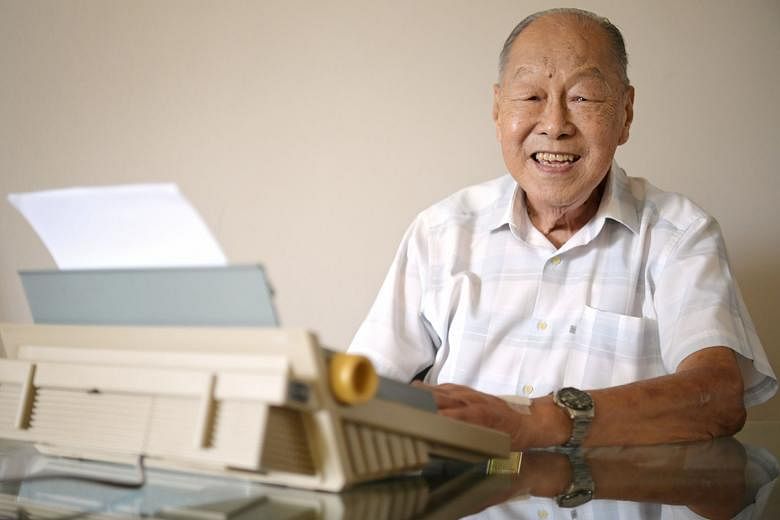Seated in his Yishun apartment, with a cup of coffee in his hand and the television playing a variety show, Mr Geoffrey Tan, 91, looks like a typical grandfather.
However, his life has been far from ordinary because of his experiences in World War II. A passionate and articulate storyteller, his adventures and war memories come to life as he tells them in minute detail.
Last month, he wrote to The Straits Times (ST) in response to an article on how OKA 9420 - the local branch of the Japanese biological and chemical warfare research and development Unit 731 - had been used as a base to breed rat fleas carrying the bubonic plague.
He had worked there as a laboratory assistant when he was 16. In his e-mail to ST, he provided new and undocumented insight into some of the activities that went on behind the closed doors of the unit, which was located at the College of Medicine Building in Outram.
For instance, he wrote that the complex was a hive of activity with about 500 locals employed in various capacities. Also, different animals were bred there.
He said: "White mice, rabbits, guinea pigs, ponies and mules were bred in the outhouses. The boilers were kept running at full steam 24 hours a day for instant sterilisation of laboratory equipment.
"There was no special biohazard disposal for dead animals. The dead mice in our laboratory were simply discarded as common rubbish, with no consideration for public health."
During a follow-up interview with ST on Nov 20, Mr Tan produced a book he had written about his war experiences.
Back in 1995, his granddaughter Melanie Teo, then 10, had asked him to write them down for her. Mr Tan said: "She told me, 'Grandpa, you have these stories to tell, can you write them down so I can read them from start to end?'"
Over two years, he recounted his war memories on paper, writing them by hand. His stories were so engaging that she persuaded him to painstakingly type them out into a manuscript for publication.
The book, Escape From Battambang: A Personal World War II Experience, had a small print run in 2001. It is still found in some school libraries today.He was also invited to give talks in schools.
In his book, Mr Tan tackles the serious subject of war in his trademark candid manner. For instance, he wrote how a friend was "hit in his butt" by bomb shrapnel because his rear was sticking out of a drain during an air raid.
Food was scarce and on some nights, his family went to sleep with just water in their stomachs. His mother, a midwife, had many customers, but a nationwide food shortage meant they often went hungry.
So Mr Tan went to work with OKA 9420 for a few months. Every day, he brewed a bouillon of pig's stomach and liver. Acidic chemicals and tetanus bacteria would later be added to the soup to create cultures as the Japanese tried to produce an anti-tetanus vaccine for their troops.
But the job was far from smooth sailing. Mr Tan worked under a tyrant - a stocky Japanese man named Takemoto who would hit staff over mistakes. Once, he smacked Mr Tan for breaking a small piece of equipment. The blow cut his lip and loosened a molar.
Mr Tan later worked in another job under the Japanese. He was sent to Bangkok to build bamboo barracks. After about a month, he was taken to Battambang, Cambodia, to build the same kind of barracks (it was forced labour under the guise of a job with very minimal wages).
Food and water were scarce. He said: "We had to share water from a wallowing pool used by buffaloes."
After two months, he and his friends hatched an elaborate plan to escape. They cut the phone line linking their camp to a military one, walked 15km to a highway and hitched a ride on the roof of an overcrowded bus to Phnom Penh.
They then took a train to Bangkok, where Mr Tan hid for six months. He found his way back to Singapore at the end of the war in 1945 and was reunited with his mother and four siblings.
After the war, Mr Tan joined the British Military Administration in Labuan, Malaysia. He later worked at Borneo Company, moving up the ranks and retiring as a director in 1987.
He then travelled the world with his wife of 65 years, Ms Molly Heng, 87. The couple, who attend Yishun Christian Church, have two daughters, a son and five grandchildren.
Mr Tan's only regret in life - not getting to complete his education at St Andrew's Secondary School.
"The Japanese came at the wrong time, preventing me from completing my education at the age of 14. I've not been particularly successful but I've led a full and happy life."
These days he spends his time writing about his life in a journal - a gift from Ms Teo, now 32, who lives in New York.
She said: "I have looked up to my grandfather for as long as I can remember, and one of the biggest reasons for this is his sense of adventure about the world and his zest for life.
"He remembers events and experiences with such detail that you, as the listener, truly feel like you are right there alongside him."
She said she bought the journal for her grandfather so he could reflect on the "long, happy life he has led and relive his younger days", and so that the family's future generations can learn about the family's heritage and the country's history.
Today, Mr Tan is "staunchly independent", said Ms Teo. He still takes the train to Orchard Road on his own to meet friends.
He is also alert and sharp, and carries few emotional wounds from the war. The only time sadness washes over him is when he talks about the kidney dialysis sessions he has to go for every Tuesday, Thursday and Saturdays.
He said: "It's mind-numbing. Friends my age have died so I've no one to talk to to keep me occupied."
THE LIVES THEY LIVE: Know of a Singaporean born before December 1949 who has lived a storied life? E-mail us at stnewsdesk@sph.com.sg.


